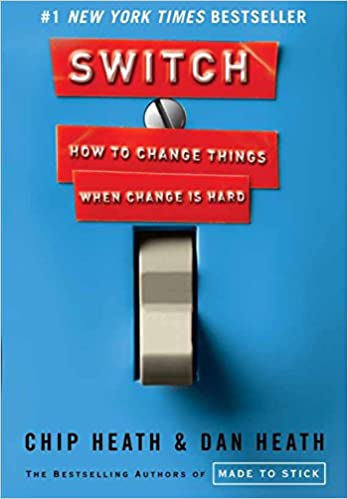...and others don't
by Janice Morris, Director
Kids who have a certain mindset about learning excel more frequently than those who simply have talent. In their innovative book, Switch (How To Change Things When Change Is Hard), Chip & Dan Heath have compiled a fabulous (and engaging) collection of ideas, resources and research regarding change and growth.
One of the concepts that was most striking to me was how one particular mindset affects achievement. To determine if you have this mindset (and can therefore pass it on to your kids,) they encourage you to read the following four sentences and write down whether you agree or disagree with each of them:
-
You are a certain of kind of person, and there is not much that can be done to really change that
-
No matter what kind of person you are, you can always change substantially
-
You can do things differently, but the important parts of who you are can't really be changed
-
You can always change basic things about the kind of person you are
"Fixed Mindset" Versus "Growth Mindset"
If you believe that your abilities basically stay the same (you said “yes” to sentences 1 and 3), then you believe that you are just wired a certain way and can never change much. In the long run, this mindset, says Heath, will cause a person to tend to avoid difficult issues or set low expectation of himself. This is because he thinks that failure is an indication of his actual ability, so why try? It is not like another personality test in which there are no wrong answers. Switch describes the devastating impact of this “wrong” (I might say “misguided”) mindset. (For more insight, see the story pasted at the end of this article.)
Those with a “Growth Mindset” on the other hand, believe they can (and should) always be growing and changing and that practice is critical. Growth “mindsetees” do not assume they should be able to do something after just a small amount of effort (like fixed s mindset person might think.) Growth Mindset people seek out opportunities to stretch and grow and have a much easier time accepting criticism. Why? Because they see it is as a step to make them better.
The Heath's cite fascinating research by Carol Dweck, a professor of psychology at Stanford who not only coined the terms "fixed" and "growth" mindsets, but who has thoroughly studied how these two mindsets affect the performance of all kinds of people—from Olympic athletes to accomplished musicians and everyday people in between. In her “must read “ [according to Heaths] book, Mindset, The New Psychology of Success, she shares research results that strongly indicate that a growth mindset will make us more successful at almost anything. Think about it. If we stretch, risk, accept feedback and persevere, we can't help but progress in whatever we set our minds to accomplish.
How does this affect us as parents and how in the world is it relevant to music education?
As we become aware of these opposing concepts, Dweck says we can begin to notice our own mindsets in the way we interact with our kids. For example, each time we say “ You're so talented” or “You are great at soccer” we are actually feeding the mindset that our kids are just wired that way. This can, Heath implies, undermine the energy we need to persevere and grow. A better approach might be to say “I am proud of how hard you worked getting ready for the recital” or “ I noticed how you carefully followed the coach's advice about dribbling” or “I love you how you are keeping your fingers rounded when you play. They are really getting stronger!”
Can we spot the difference? One approach tells our child that they are wired a certain way and no matter what, they will be that way, with only slight alterations possible. And the other tells them “Keep persevering, I am proud of your effort, and it will pay off.”
In Music Education
Parents sometimes decide that their child just does not have what it takes to learn to play an instrument, or that they are not naturally talented. In fact, many parents tell me that they themselves are not musical or have no talent based on the fact that they either never pursued or never persevered in music instruction. The truth is, anyone can learn to play an instrument well, but some will find it a little easier than others because of a natural inclination or wiring; however the right mindset (“you can get better at this”), and the right teacher connection at the right phase of the learning journey (Read more about how our phase 1, 2 or 3 philosophy), and teachers can make all the difference!
One last reminder about the process. It is always hard in the middle season of the learning. I am convinced that great musicians are lost to our society because they give up during the necessarily challenging middle season of learning. The Heath's discuss an enlightening perspective used in successful businesses that underscores the concept that “Everything can look like a failure in the middle.” The learning curve is just that, a curve. It looks a little like a “U”.
Think about your own successes. In any kind of learning, not just music, the highest achievers begin with enthusiasm and positivity and as they hit walls while fleshing out the learning, those with a fixed mindset might decide: “I am just not good at this”, but those with a growth mindset will say “I can do this. What feels like failure in the middle is just part of the process.” When we persevere, we eventually hit that upward cycle of the “U” and make enough progress that motivates us toward excellence. Churchill challenged us: “Never! Never! Never give up!” I cannot tell you how exciting it is for me to host a recital and see kids who have pushed through the walls of discouragement or apathy and are now playing fluently and with deep satisfaction in their progress because their parents encouraged them to keep going.
It happens all the time. It has happened to you in some area of life in which you do well. It has happened to me. Help make it happen for your kids by strongly encouraging their efforts through the difficult seasons, not just their wiring.
Next time I will tell you my own “U” shaped story.
---Janice Morris, Founding Director
Addendum
Here is an inspiring story from Mindset, The New Psychology of Success, by Carol Dweck.
 After two hours per week of training about the "growth mindset" and the ability of the brain like a muscle to grow and expand, kids began to believe they were not stuck the way they were. ("After all, who laughs at a baby because they cannot talk yet?")
After two hours per week of training about the "growth mindset" and the ability of the brain like a muscle to grow and expand, kids began to believe they were not stuck the way they were. ("After all, who laughs at a baby because they cannot talk yet?")
“One day, we were introducing the growth mindset to a new group of students. All at once, Jimmy, the most hard-core, turned off, low-effort kid in the group---looked up with tears in his eyes and said 'You mean I don't have to be dumb?'. From that day on, he worked, He started staying up late to do his homework, which he never used to bother with at all. He started handing in assignments early so he could get feedback and revise them. These kids now believe that working hard was not something that made you vulnerable, but something that made you smarter."
